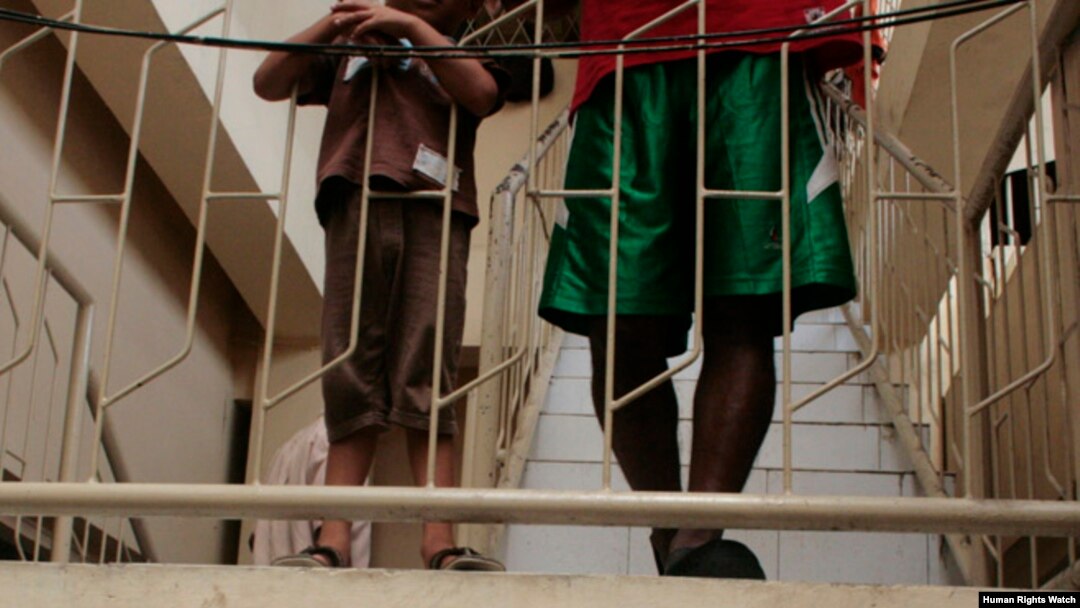LONDON —
Hundreds of children who have fled war, violence, and poverty have been detained in Indonesia and face violent and degrading conditions, according to a Human Rights Watch report published Monday. The report says some are held in detention for years.
The Human Rights Watch report says more than 1,000 unaccompanied children arrived in Indonesia in 2012. Many, it says, were detained by Indonesian authorities and faced inhumane conditions in overcrowded, unsanitary, and occasionally flooded detention centers.
HRW human-rights researcher Andreas Harsono says the children rarely see sunlight.
"Sometimes, once in a week or twice in a week, they are given the freedom to walk inside the compound of the migrant detention center where they can walk free, running around, playing - being children," he said.
The HRW report is based on interviews with more than 100 migrants, including 42 who were children when they entered Indonesia.
It says the migrants described guards kicking, punching, and slapping them and, in one case, parents said immigration guards forced their children to watch guards beat other migrants.
Harsono says the number of migrants entering Indonesia is on the rise and many have experienced persecution in nearby countries, including Afghanistan, Pakistan, Burma and Iran.
"The Indonesian government should open their eyes that increasingly over the past three to five years, because of the conflict in the Middle East and in South Asia, because of the persecution of minorities there, religious minorities mostly, these people are running away," he said.
Indonesia has not ratified the 1951 Refugee Convention. The U.N. Refugee Agency is responsible for processing asylum claims, but Human Rights Watch says even when the agency recognizes people as refugees, Indonesia often refuses to release them from detention.
Harsono says for those who avoid detention, the goal is to reach Australia. For them, a dangerous journey lies ahead.
"If they are lucky, they are not arrested," he said. "It takes them another year or a year-and-a-half to get them to another smuggler who specializes in using boats to cross the Indian Ocean into Australia."
Human Rights Watch says hundreds are thought to die on these crossings each year.
Last week, the Australian Immigration Department announced that more than 700 unaccompanied minors are in the Australian immigration network.
The Human Rights Watch report says more than 1,000 unaccompanied children arrived in Indonesia in 2012. Many, it says, were detained by Indonesian authorities and faced inhumane conditions in overcrowded, unsanitary, and occasionally flooded detention centers.
HRW human-rights researcher Andreas Harsono says the children rarely see sunlight.
"Sometimes, once in a week or twice in a week, they are given the freedom to walk inside the compound of the migrant detention center where they can walk free, running around, playing - being children," he said.
The HRW report is based on interviews with more than 100 migrants, including 42 who were children when they entered Indonesia.
It says the migrants described guards kicking, punching, and slapping them and, in one case, parents said immigration guards forced their children to watch guards beat other migrants.
Harsono says the number of migrants entering Indonesia is on the rise and many have experienced persecution in nearby countries, including Afghanistan, Pakistan, Burma and Iran.
"The Indonesian government should open their eyes that increasingly over the past three to five years, because of the conflict in the Middle East and in South Asia, because of the persecution of minorities there, religious minorities mostly, these people are running away," he said.
Indonesia has not ratified the 1951 Refugee Convention. The U.N. Refugee Agency is responsible for processing asylum claims, but Human Rights Watch says even when the agency recognizes people as refugees, Indonesia often refuses to release them from detention.
Harsono says for those who avoid detention, the goal is to reach Australia. For them, a dangerous journey lies ahead.
"If they are lucky, they are not arrested," he said. "It takes them another year or a year-and-a-half to get them to another smuggler who specializes in using boats to cross the Indian Ocean into Australia."
Human Rights Watch says hundreds are thought to die on these crossings each year.
Last week, the Australian Immigration Department announced that more than 700 unaccompanied minors are in the Australian immigration network.


